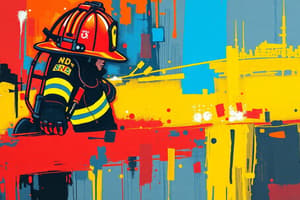Podcast
Questions and Answers
Which of the following BEST describes the purpose of personal protective equipment (PPE)? (Select all that apply)
Which of the following BEST describes the purpose of personal protective equipment (PPE)? (Select all that apply)
- Designed to isolate firefighters during incident
- Designed to eliminate injuries
- Designed to minimize discomfort while at incident
- Designed to minimize risk of injury or fatality (correct)
Structural firefighting protective clothing must meet what NFPA standard?
Structural firefighting protective clothing must meet what NFPA standard?
- 1971 (correct)
- 1982
- 1977
- 1500
Which of the following BEST describes why personal protective equipment (PPE) should never be altered?
Which of the following BEST describes why personal protective equipment (PPE) should never be altered?
- May create confusion at the incident scene
- May void manufacturer's warranty and endanger lives (correct)
- May cause misidentification with Incident Command
- May significantly increase breathing, heart rate, and skin temperature
Which of the following BEST describes a design limitation of structural firefighting personal protective equipment (PPE)?
Which of the following BEST describes a design limitation of structural firefighting personal protective equipment (PPE)?
What part of structural firefighting personal protective equipment (PPE) prevents scalding water and embers from reaching the ears and neck?
What part of structural firefighting personal protective equipment (PPE) prevents scalding water and embers from reaching the ears and neck?
What part of structural firefighting personal protective equipment (PPE) is intended for use in combination with a primary form of eye protection?
What part of structural firefighting personal protective equipment (PPE) is intended for use in combination with a primary form of eye protection?
What part of structural firefighting personal protective equipment (PPE) is designed to fit inside a protective coat?
What part of structural firefighting personal protective equipment (PPE) is designed to fit inside a protective coat?
Which of the following BEST describes why the liner should never be removed from a protective coat?
Which of the following BEST describes why the liner should never be removed from a protective coat?
Which of the following structural firefighting personal protective equipment (PPE) components must allow enough dexterity and tactile feel to perform the job required?
Which of the following structural firefighting personal protective equipment (PPE) components must allow enough dexterity and tactile feel to perform the job required?
What part of structural firefighting personal protective equipment (PPE) must be high enough to protect the lower leg?
What part of structural firefighting personal protective equipment (PPE) must be high enough to protect the lower leg?
What part of structural firefighting personal protective equipment (PPE) is worn when noise exceeds maximum noise exposure levels?
What part of structural firefighting personal protective equipment (PPE) is worn when noise exceeds maximum noise exposure levels?
What part of structural firefighting personal protective equipment (PPE) is useful in total darkness and confined spaces?
What part of structural firefighting personal protective equipment (PPE) is useful in total darkness and confined spaces?
Which NFPA standard outlines the specifications for wildland personal protective clothing?
Which NFPA standard outlines the specifications for wildland personal protective clothing?
What part of wildland personal protective equipment (PPE) must meet the requirements of ANSI Z87.1?
What part of wildland personal protective equipment (PPE) must meet the requirements of ANSI Z87.1?
Steel toe boots are not recommended for wildland protective clothing because they:
Steel toe boots are not recommended for wildland protective clothing because they:
What piece of personal protective equipment (PPE) can be worn to increase visibility at roadway incidents?
What piece of personal protective equipment (PPE) can be worn to increase visibility at roadway incidents?
What component of emergency medical protective clothing may be dual certified for use in the station as well?
What component of emergency medical protective clothing may be dual certified for use in the station as well?
Flashcards are hidden until you start studying
Study Notes
Personal Protective Equipment (PPE) Overview
- PPE is designed to minimize risk of injury or fatality during fire incidents.
- Altering PPE may void manufacturer's warranty and endanger lives.
NFPA Standards
- Structural firefighting protective clothing must meet NFPA 1971 standards.
- NFPA 1977 outlines specifications for wildland protective clothing.
Components of Structural Firefighting PPE
- Helmets protect ears and neck from scalding water and embers.
- Helmet-mounted faceshields are intended for use with primary eye protection.
- Protective hoods fit inside protective coats for additional coverage.
- Protective gloves must provide dexterity and tactile feel necessary for firefighting tasks.
- Protective footwear must be high enough to safeguard the lower leg.
- Hearing protection devices are vital when noise exceeds maximum exposure levels.
- Personal alert safety systems are useful in conditions of darkness and confined spaces.
Design Limitations and Safety Features
- PPE fabric prevents heat transfer away from the body but does not eliminate heat exposure.
- Removing the liner from a protective coat compromises design and increases injury risks.
Wildland Protective Equipment
- Goggles must meet ANSI Z87.1 requirements for protection.
- Steel toe boots are not recommended for wildland attire as they absorb and retain heat.
Visibility and Emergency Medical PPE
- Traffic vests with retroreflective trim enhance visibility at roadway incidents.
- Components of emergency medical protective clothing, such as footwear, may be dual-certified for both station and field use.
Studying That Suits You
Use AI to generate personalized quizzes and flashcards to suit your learning preferences.




